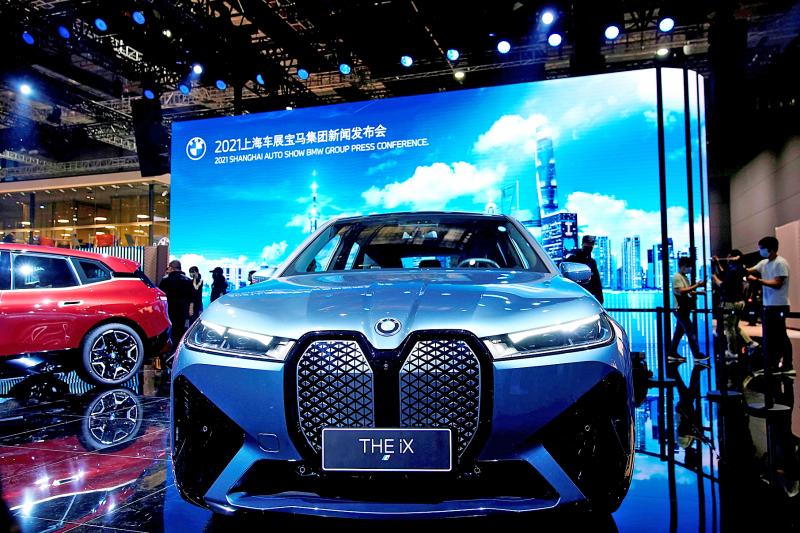BMW AG expects the global shortage of semiconductors hindering auto production to be resolved, as companies and governments zero-in on the issue.
“There’s intense focus on the issue globally, so it’s to be expected for supply and demand to be back in balance within two years at the latest,” BMW chief executive officer Oliver Zipse said in an interview on Thursday at the company’s driving academy near Munich, Germany.
A lack of chips used in everything from navigation systems to certain rear-view mirrors has forced automakers to curtail production just as demand picks up in major economies that are easing COVID-19 pandemic restrictions.

Photo: Reuters
While Ford Motor Co last month estimated the scarcity of semiconductors would slash earnings by US$2.5 billion this year, BMW has only reported limited stoppages at two European plants thus far.
Zipse’s optimistic view contrasts with some of his peers.
Renault SA CEO Luca De Meo on Thursday said the chip crisis has exposed the “frightening” fragility of complicated supply lines where whole industries depend on highly specialized manufacturers.
What were valid strategies 20 years ago should be revisited, he said.
Volkswagen AG cautioned the semiconductor shortage would become more pronounced in the second quarter, though it still raised its full-year earnings outlook.
BMW yesterday sent a similarly upbeat message, saying it expects automotive returns to reach the upper end of its 6 to 8 percent forecast.
Strong demand spreading from China to the US and Europe is helping offset higher prices for raw materials such as copper.
The chip shortages that arose after consumers snapped up electronic gadgets en masse while confined at home have spurred broad efforts to boost production. The European Commission plans to double the bloc’s chip production to at least 20 percent of world supply by 2030, a move that would reduce its reliance on foreign companies for the critical components.
US President Joe Biden has vowed to better secure the US’ supply chain by reviving domestic chip manufacturing.
Taiwan Semiconductor Manufacturing Co (台積電) plans to spend as much as US$28 billion on new plants and equipment this year.
While waiting for investment programs to gather pace, manufacturers have had little choice but to idle plants or take the unusual step of stripping certain high-tech features from select models.
Zipse said BMW has no plans to seek new partnerships or joint ventures despite current restraints.
“For critical components, we’ll stick with long-term supply contracts and a range of different partners,” he said.
This will include battery cells critical to accelerating BMW’s rollout of electric vehicles.
“From our point of view, we’ve covered the necessary supplies with long-term contracts,” he said.

Taiwan’s rapidly aging population is fueling a sharp increase in homes occupied solely by elderly people, a trend that is reshaping the nation’s housing market and social fabric, real-estate brokers said yesterday. About 850,000 residences were occupied by elderly people in the first quarter, including 655,000 that housed only one resident, the Ministry of the Interior said. The figures have nearly doubled from a decade earlier, Great Home Realty Co (大家房屋) said, as people aged 65 and older now make up 20.8 percent of the population. “The so-called silver tsunami represents more than just a demographic shift — it could fundamentally redefine the

Businesses across the global semiconductor supply chain are bracing themselves for disruptions from an escalating trade war, after China imposed curbs on rare earth mineral exports and the US responded with additional tariffs and restrictions on software sales to the Asian nation. China’s restrictions, the most targeted move yet to limit supplies of rare earth materials, represent the first major attempt by Beijing to exercise long-arm jurisdiction over foreign companies to target the semiconductor industry, threatening to stall the chips powering the artificial intelligence (AI) boom. They prompted US President Donald Trump on Friday to announce that he would impose an additional

China Airlines Ltd (CAL, 中華航空) said it expects peak season effects in the fourth quarter to continue to boost demand for passenger flights and cargo services, after reporting its second-highest-ever September sales on Monday. The carrier said it posted NT$15.88 billion (US$517 million) in consolidated sales last month, trailing only September last year’s NT$16.01 billion. Last month, CAL generated NT$8.77 billion from its passenger flights and NT$5.37 billion from cargo services, it said. In the first nine months of this year, the carrier posted NT$154.93 billion in cumulative sales, up 2.62 percent from a year earlier, marking the second-highest level for the January-September

Asian e-commerce giant Shein’s (希音) decision to set up shop in a historic Parisian department store has ruffled feathers in the fashion capital. Anger has been boiling since Shein announced last week that it would open its first permanent physical store next month at BHV Marais, an iconic building that has stood across from Paris City Hall since 1856. The move prompted some French brands to announce they would leave BHV Marais, but the department store had already been losing tenants over late payments. Aime cosmetics line cofounder Mathilde Lacombe, whose brand was among those that decided to leave following